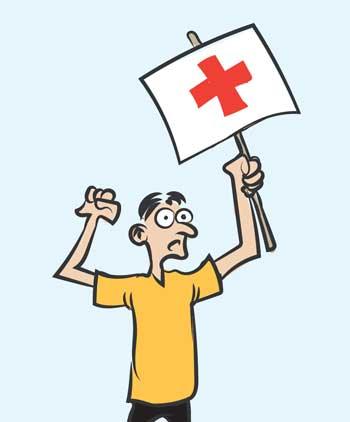04 Apr 2024 - {{hitsCtrl.values.hits}}
 Sri Lanka’s public health service is facing one of its worst crises since independence. President Ranil Wickremesinghe and the Sri Lanka Podujana Peramuna government need to give much more priority to help the public health service recover; because as the cliché goes: “health is wealth”.
Sri Lanka’s public health service is facing one of its worst crises since independence. President Ranil Wickremesinghe and the Sri Lanka Podujana Peramuna government need to give much more priority to help the public health service recover; because as the cliché goes: “health is wealth”.
With public health trade unions staging regular strikes during the past two years, poor people have had to travel a long way to a public hospital only to be told that the nurses, attendants and other paramedical staff are on strike and that the people need to go back without treatment. The crisis involving former Health Minister Keheliya Rambukwella made the situation worse with the importation of substandard drugs from fictitious companies. The tragedy is that this is happening in the country which produced Prof. Senaka Bibile who was widely regarded as a prophet of modern medicine, and proposed a solution to the drug crisis.
He proposed that Sri Lanka should import only about 500 varieties of drug. The figure could be put at 1,000 varieties. But today, Sri Lanka, despite its foreign exchange crisis, is importing more than 10,000 varieties of drugs. Prof. Bibile’s solution was that drugs should be imported based on five factors—quality, safety, efficacy, the cost of the drugs and the need for it. Based on this, the State Pharmaceuticals Corporation (SPC) was setup with Prof. Bible serving both as chairman and trade union leader.
The SPC was setup to gradually manufacture most of the drugs here so that Sri Lanka could save on foreign exchange. But, the international drug mafia is reported to have influenced the United States (US) government to get rid of Prof. Bibile. The then Prime Minister Sirimavo Bandaranaike was forced to do so because the US government threatened to cut off vital supplies of PL 480 wheat stocks. So, Prof. Bibile left and worked for the United Nations in British Guyana where he died in mysterious circumstances.
On Sunday April 7, the World Health Organisation (WHO) will mark the World Health Day. In a statement, the WHO said that around the world, the right to health of millions is increasingly coming under threat. Diseases and disasters loom large as causes of death and disability. Conflicts are devastating lives, causing death, pain, hunger and psychological distress.
According to the WHO, the burning of fossil fuels is simultaneously driving the climate crisis and taking away our right to breathe clean air, with indoor and outdoor air pollution claiming a life every 5 seconds.
The WHO Council on the Economics of Health for All has found that at least 140 countries recognize health as a human right in their constitution. Yet, countries are not passing and putting into practice laws to ensure their populations are entitled to access health services. This underpins the fact that at least 4.5 billion people—more than half of the world’s population—are not fully covered by essential health services.
To address these types of challenges, the theme for World Health Day 2024 is: “My health, my right”. This year’s theme was chosen to champion the right of everyone, everywhere to have access to quality health services, education and information, as well as safe drinking water, clean air, good nutrition, quality housing, decent working and environmental conditions and freedom from discrimination.
The prominent equal rights advocate Martin Luther King Jr. has said, “For he who has health has hope; and he who has hope, has everything. Of all the forms of inequality, injustice in health is the most shocking and inhumane.”
25 Nov 2024 22 minute ago
24 Nov 2024 9 hours ago
24 Nov 2024 24 Nov 2024
24 Nov 2024 24 Nov 2024
24 Nov 2024 24 Nov 2024